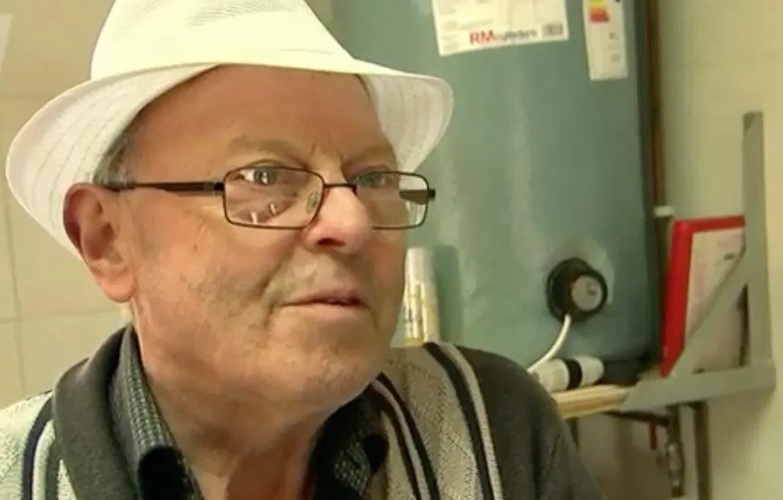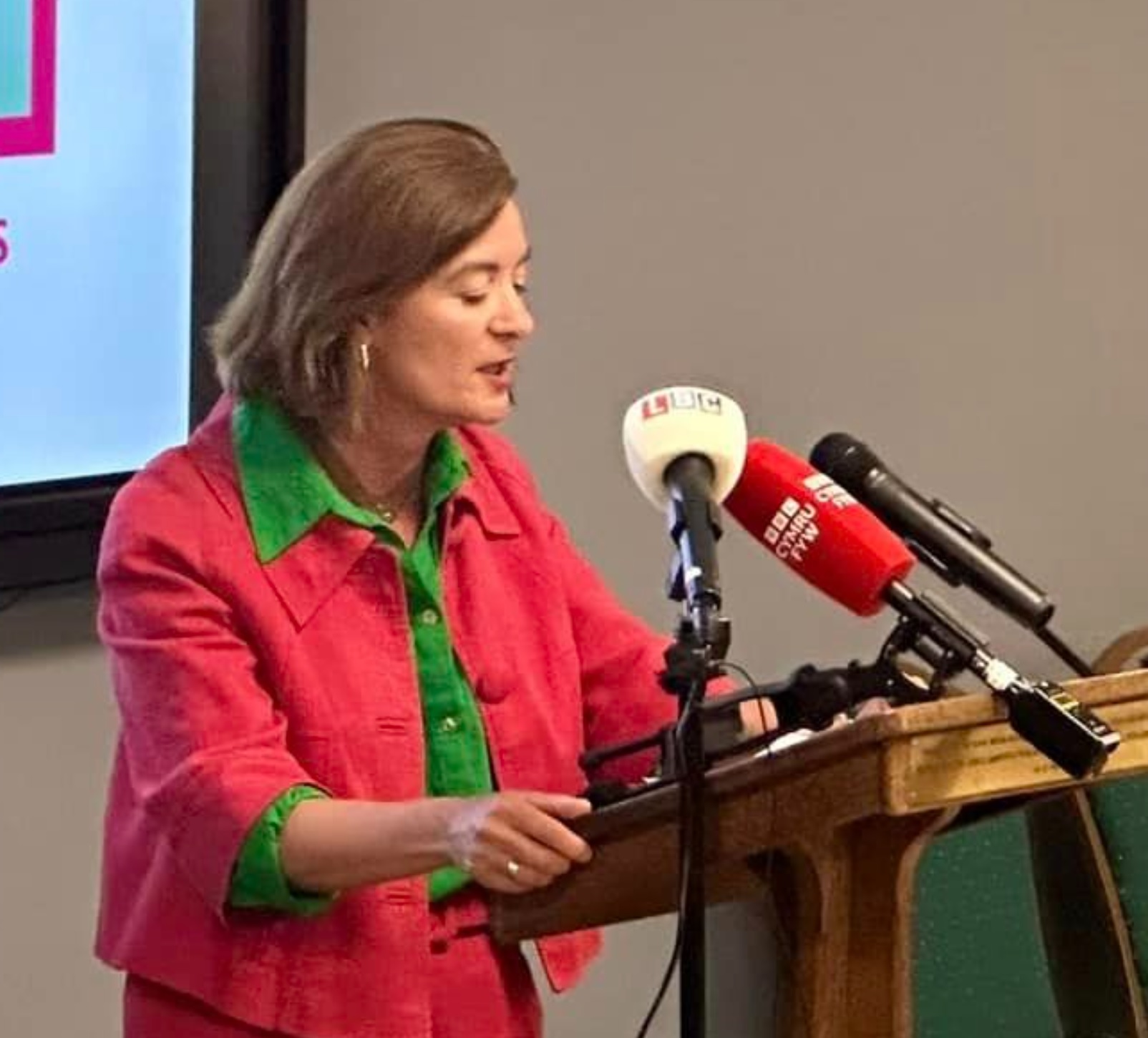News
Jury out in chip shop murder trial

THE JURY has retired to consider its verdict regarding the trial of a man who is charged with murdering his wife with a chip shop fryer.
Geoffrey Bran, aged 70 from Hermon in Carmarthenshire, is accused of murdering his wife Mavis on October 23 last year, and is alleged to have thrown scalding hot oil over her from a deep fat fryer, which gave her widespread burns and lead to her death later in hospital.
He had also burnt his own hand when he tried to help her remove her jumper, which was saturated in the boiling hot oil, by trying to pull it over her head.
Earlier this week, Bran gave evidence to the court in his own defence. He told the court that there would be arguments about nothing after his wife would drink alcohol and have ‘spells of paranoia moments’ in the day, but claimed he had never hit his wife during a confrontation. He said that Mavis would start drinking early, and would consume two and a half bottles of red wine.
Bran told the court they opened the Chipoteria because Mavis was doing some meals for elderly people in the village, and didn’t like retirement because she was always on the go. He said he built a cabin next to the caravan, which took around a year, because Mavis desperately wanted to open in January. He said he would clean and blanch chips, fry them, and clean the equipment after. Mavis would cook fish and pies, and make sauces.
On the day that Mavis died, Bran said Mavis was in a good mood, but had been drinking from around 9.30am that day. He said she consumed a brandy with two neighbours, and he didn’t notice anything different about her behaviour when she had been drinking.
Bran spoke about an order, for which his wife said the fat wasn’t good enough to cook the fish in. He said: “I said you may as well use my friers, I use you for chips, but you have to turn them down because they’re a bit high for fish.”
He claimed that shortly afterwards, she looking into the fryer and told him he had overdone them. He said: “I didn’t know I was meant to look after them. She said she was coming back straight away.”
With that, he said Mavis took the fish out with tongs and tossed them into a tray, resulting in a ‘waterfall of fat’. He told her he had seen worse on plates, and said he believed she wasn’t going to serve them.
He went on to describe that he went to blanch some chips, but happened to turn around to see that Mavis had fallen, and her head was about nine inches away from the floor.
He said: “I hadn’t seen her falling because I wasn’t looking at that point. I turned around and saw her flying to the floor. In the corner of my eye I could see the fat fryer moving on the table as if in slow motion, but it wasn’t slow motion. At the moment I was going to move I could see the legs … instantly the legs fell off the edge and the weight of the oil tipped the whole thing forwards the whole two tubs came out in one whoosh.
“Once the legs got over the edge the weight of the oil must have moved things fast without the tubs coming out and it was like a waterfall and landed on her chest.
“By this time now the whole unit was going through the air and landing on top of her, pulling the sockets out.”
He continued: “I grabbed her arm, grabbed her other arm, pulled her to a sitting position, and lift all her clothes off. I didn’t know whether I was doing the right thing to be honest. I just thought get the clothes off. She was wearing a thick jumper and a t-shirt underneath. Usually she wears a kitchen apron, but because we had guests that day she had forgotten to change.
“I grabbed the bottom of the jumper and pulled it off her head. I think the jumper came into contact with her face.”
When asked if he felt any pain, he said he couldn’t remember, and was trying to get her clothes off her.
He said: “I walk round her, grab her two arms and pull her to a standing condition. I pulled her to the slabs outside. At that point I forgot I didn’t have a phone. I’d forgotten to bring it down in the morning. We always took the mobile phone back to the house in the night to charge it.”
Bran said he told her to run up the house in order to call an ambulance. He said: “She screamed up the path. She was in shock but she knew what was happening. I could see her arms were peeling. That’s about it really because all the rest was quite red.”
When asked why he didn’t go with her or why he didn’t comfort her, she said he didn’t know and was ‘totally stumped’.
The court heard how when a customer came in, Bran told them there had been an accident, but when he said he could go to Newcastle Emlyn, he said he would serve him. He said that Mavis was in a dressing gown shaking, and her face was white.
Bran was kept in custody until October 24. He was asked if he visited Mavis in hospital, but said he was told he was not allowed to.
He said he wanted to see her to say goodbye, and told the court that he misses her every day.
During cross examination, Bran was pressed as to why he didn’t comfort his wife of 30 years and ask about how she was. He told the court he ‘couldn’t face it’, but couldn’t say why.
He claimed that his wife deliberately lied to paramedics and blamed him for burning her. He said ‘they are all lies’, and said that she would always make things up and blamed him for everything.
Bran was asked, if he had helped to remove Mavis’ clothing, why he didn’t have burns on both hands. He couldn’t answer.
The court heard that Mavis suffered 46% burns to her total body area. The burns were both partial and full thickness.
The front of her body mostly suffered from full thickness burns, including her torso, thigh and neck. Her eyes were closed when she suffered the partial thickness burns to her face. Her eyelids were burned, but not her eyes themselves. There were no burns to the back of her hands, her palms or her fingers, but there were to her inner forearms. They were likely secondary burns, caused by the removal of her clothing.
The burns proved to be fatal when her condition deteriorated. As a result, the burns she suffered caused her death.
The jury retired at 12.51pm on Monday (Nov 18) to consider the case. Judge Paul Thomas QC, said: “Members of the jury I am now going to ask you to retire and consider your verdict in this case. There is no pressure of time. Take as short or as long time as needs be. As far as today is concerned, if you have reached a verdict that is well and good; if you haven’t you will be sent home and return tomorrow.”
The jury has since retired and the court awaits a verdict.
News
Paris in February made easy with special direct Air France flights from Cardiff

TRAVELLING to Paris has never been simpler for Welsh holidaymakers, with Air France launching a series of special direct weekend services from Cardiff Airport to the French capital this month.
The limited-period flights offer a convenient, non-stop journey of under two hours to Paris, giving passengers more time to enjoy the city’s culture, cuisine and famous landmarks without the hassle of connections or long road transfers to other UK airports.

Timed perfectly for winter city breaks and Valentine’s getaways, the services run between February 13 and February 16, making them ideal for long weekends.
February is widely considered one of the best times to visit the French capital, with fewer crowds and a relaxed, romantic atmosphere. Visitors can explore world-famous attractions including the Eiffel Tower, the Arc de Triomphe and Notre-Dame Cathedral, browse galleries at the Louvre and Musée d’Orsay, or simply enjoy cafés, bistros and Michelin-starred dining across the city.
With Valentine’s Day falling during the operating period, the flights offer couples an easy escape for scenic walks along the Seine, memorable meals and classic Parisian experiences.
Jon Bridge, CEO of Cardiff Airport, said: “We’re delighted to offer direct flights to such a vibrant city for Valentine’s weekend. Cardiff Airport is expanding its reach, giving customers an easy, friendly travel experience and fantastic options. We’ve listened to passenger demand and are excited to make this opportunity possible, with more to come from Cardiff.”
Seats are available now via airfrance.co.uk and through travel agents. As availability is limited, early booking is recommended.
Flight schedule
Cardiff (CWL) to Paris (CDG)
• Feb 13 – AF4149 – 6:20pm → 8:50pm
• Feb 14 – AF4149 – 3:20pm → 5:50pm
• Feb 15 – AF4149 – 9:20am → 11:50am
• Feb 15 – AF4151 – 9:00pm → 11:30pm
• Feb 16 – AF4149 – 9:20am → 11:50am
• Feb 16 – AF4151 – 5:50pm → 8:20pm
Paris (CDG) to Cardiff (CWL)
• Feb 13 – AF4148 – 5:00pm → 5:30pm
• Feb 14 – AF4148 – 2:00pm → 2:30pm
• Feb 15 – AF4148 – 8:00am → 8:30am
• Feb 15 – AF4150 – 7:40pm → 8:10pm
• Feb 16 – AF4148 – 8:00am → 8:30am
• Feb 16 – AF4150 – 4:30pm → 5:00pm
Education
Language commissioner launches probe into school closure impact on Welsh

THE WELSH Language Commissioner has launched a formal investigation into claims that the proposed closure of a rural Carmarthenshire primary school did not properly assess the impact on the Welsh language.
Campaign group Cymdeithas yr Iaith confirmed this week that the Welsh Language Commissioner will examine whether Carmarthenshire County Council complied with its legal duties when producing a language impact assessment linked to plans to close Ysgol Llansteffan.
The council issued a statutory notice last year proposing to shut the village school at the end of the summer term as part of wider education reorganisation. A final decision had been expected this spring.
However, the investigation now creates fresh uncertainty over the timetable.

Complaint over ‘insufficient assessment’
Cymdeithas yr Iaith says it submitted a formal complaint arguing that the council failed to produce a sufficiently detailed assessment of how the closure could affect Welsh-medium education and the wider Welsh-speaking community.
The group claims the authority selectively used data to support closure rather than examining all available evidence objectively.
Two key concerns were raised.
Firstly, campaigners argue there may not be enough places in neighbouring Welsh-medium schools to accommodate pupils from Llansteffan and nearby housing developments, potentially forcing some families into English-medium provision.
Secondly, they say the assessment did not meaningfully consider the school’s role as a community hub or explore ways the site could generate income and support local Welsh-language activities.
On behalf of local members, Ffred Ffransis said: “There will not be places for all the Llansteffan children, nor for the children of the new housing estates, in other Welsh-medium schools in the area.
“The most cost-effective way of providing sufficient places locally in Welsh-medium education is by keeping open Ysgol Llansteffan and making better use of the buildings, including environmental education and community use.”
Formal investigation
In a letter to the group, the commissioner confirmed an investigation will be held under Section 71 of the Welsh Language Measure to determine whether the council complied with Welsh language standards.
The probe could take up to three months.
Campaigners believe this may delay implementation of the closure and could require the council to revisit its assessment and potentially carry out a fresh statutory consultation.
Ffransis said: “Even if the council now decided to make a full and meaningful assessment, there would likely have to be a new consultation. The original decision may have been taken on a faulty basis.”
He added that similar concerns had been raised about language impact assessments connected to other proposed school closures in the county.
Council position
The council has previously said that school reorganisation proposals are driven by falling pupil numbers, financial pressures and the need to ensure sustainable, high-quality education.
Authorities across Wales have faced difficult decisions in recent years as rural rolls decline and building maintenance costs rise.
It is expected the council will respond formally to the commissioner’s investigation in due course.
What happens next
If the commissioner finds that language standards were not properly followed, enforcement steps could be taken and the process delayed or revisited.
For families in Llansteffan, the outcome may determine whether their local Welsh-medium school remains open beyond the summer term.
The Herald has contacted Carmarthenshire County Council for comment.
Further updates will follow as the investigation progresses.
Business
First Minister criticised after ‘Netflix’ comment on struggling high streets

Government announces 15% support package but campaigners say costs still crushing hospitality
PUBS, cafés and restaurants across Wales will receive extra business rates relief — but ministers are facing criticism after comments suggesting people staying home watching Netflix are partly to blame for struggling high streets.
The Welsh Government has announced a 15% business rates discount for around 4,400 hospitality businesses in 2026-27, backed by up to £8 million in funding.
Announcing the package, Welsh Government Finance Secretary Mark Drakeford said: “Pubs, restaurants, cafés, bars, and live music venues are at the heart of communities across Wales. We know they are facing real pressures, from rising costs to changing consumer habits.
“This additional support will help around 4,400 businesses as they adapt to these challenges.”
The announcement came hours after Eluned Morgan suggested in Senedd discussions that changing lifestyles — including more time spent at home on streaming services — were contributing to falling footfall in town centres.
The remarks prompted political backlash.
Leader of the Welsh Liberal Democrats, Jane Dodds, said: “People are not willingly choosing Netflix over the high street. They are being forced indoors because prices keep rising and wages are not.
“Blaming people for staying at home is an insult to business owners who are working longer hours just to survive.”
Industry groups say the problem runs deeper than consumer behaviour.
The Campaign for Real Ale (CAMRA) welcomed the discount but warned it would not prevent closures.
Chris Charters, CAMRA Wales director, said: “15% off for a year is only the start. It won’t fix the unfair business rates system our pubs are being crushed by.
“Welsh publicans need a permanent solution, or doors will continue to close.”
Across Pembrokeshire, traders have repeatedly told The Herald that rising energy bills, wage pressures and rates — rather than a lack of willingness to go out — are keeping customers away.
Several town centres have seen growing numbers of empty units over the past year, with independent shops and hospitality venues reporting reduced footfall outside the main tourist season.
While ministers say the relief balances support with tight public finances, business groups are calling for wider and longer-term reform.
Further debate on rates changes is expected later this year.

-

 Health6 days ago
Health6 days agoConsultation reveals lack of public trust in health board
-

 News7 days ago
News7 days agoCaldey still unsafe, survivors warn — despite Abbey’s reform claims
-

 Community7 days ago
Community7 days agoPembrokeshire students speak at national Holocaust Memorial Day event
-

 News20 hours ago
News20 hours agoPrincess of Wales visits historic Pembrokeshire woollen mill
-

 News7 days ago
News7 days agoKurtz raises Gumfreston flooding in the Senedd as petition deadline nears
-

 Crime5 days ago
Crime5 days agoPembroke man accused of child sex offences sent to Swansea Crown Court
-

 Education7 days ago
Education7 days ago‘Vulnerable teen’ questioned by police at Milford Haven School
-

 Education7 days ago
Education7 days agoAttendance concerns at Milford School reflect wider issue raised at the Senedd





























